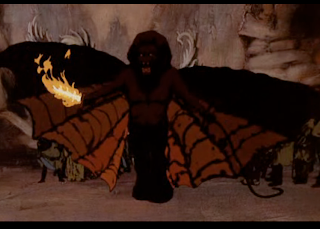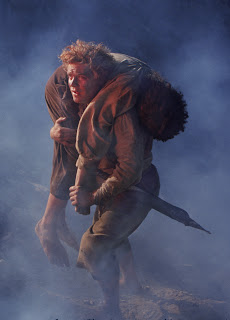Per my recent re-obsession with Tolkien's mythos/avoiding social contact with another human being, I ventured into the danker, smellier regions of the digital underworld this past week and downloaded Ralph Bakshi's 1978 animated (and incomplete) adaptation of The Lord of the Rings.
"Incomplete" is important here, because the film actually ends halfway through the The Two Towers after the battle of Helm's Deep. Regardless of how many films Bakshi intended on making, the decision to end the first installment here is a curious one. Like Peter Jackson's adaptations, many elements of Tolkien's story are omitted and with the Bakshi version's runtime clocking in at 133 minutes, even less of the original arc remains intact. When sections aren't completely removed they're still often breezed over, like a silent narrator skimming through instead of reading carefully. As a result, there are very few dramatic beats that don't feel clumsy.
What's immediately striking about this version is the huge difference in its interpretation of the source material. I'd like to just crack jokes, but the effect is really much more humorous when you see for yourself.
Who the Hell is Aruman?
Gandalf the Nag
Admittedly, it's pretty hard to screw up Gandalf. Pointy hat. Cloak. Beard. The problem isn't with his appearance so much as his temperament as he tends to concern himself more with finger-pointing and lecturing than actually providing assistance.
Nazgul
This one's not completely ridiculous, though the extent to which the Ringwraiths are actually "animated" varies wildly. Instead of carrying an ominous presence like their Jacksonian counterparts, these Ringwraiths slither in an unsettling manner like No Face in "Spirited Away." Nevertheless, "cloaked in black" and "screaming" is probably enough to point them out in a police lineup.
Samwise
Sam is where we start running into discrepancies. While I freely admit that Jackson's might have been too forgiving and sentimental a depiction of Frodo's gardener, Bakshi's is egregiously simplistic in the worst way. I cannot imagine how this gap-toothed moron, with his constant stuttering and wining, could remember which end of his pipe to light, let alone remind himself to tend to someone's garden on a regular basis. Fantasy indeed.
Aragorn
Blame Bakshi's "Sicilian wrestler" interpretation on the fashion zeitgeist of the time. I guess. At least he's voiced by John Hurt.
Saruman of Many Colors
Jackson's design team copped out with Saruman and his ever-changing colors by simply dressing him in a white cloak. Here, Bakshi chooses to call him Saruman of Many Colors (which is perfectly accurate) and dressing him in... red.
The worst part about Saruman of Many Colors (When He Feels Like It) is this "Aruman" business. Bakshi & co. tried changing his name to "Aruman," undoubtedly because it sounds so similar to Sauron, which wouldn't seem so bad if the voice actors actually remembered this:
That has to be the worst wizard "battle" of all time. Nearly limitless power at your command and how do you use it? By putting on a Pink Floyd laser show. This name change business makes for such a jarring experience that by the time the Fellowship left Rivendell, I paused my computer and thought I was hearing things:
"That would take the Ring too close to Isengard. And Aruman!"
Elrond
Elrond is quite puzzling because he looks no different than Aragorn. Nor any other man for that matter. With that haircut you can't even tell he's an elf by looking at his ears. Why's this guy so special? You'd think the Elves would have the foresight to boot him from Rivendell after refusing to change that damn white t-shirt.
Balrog
The Balrog is a genius combination of lion, man and condor. In no way does it resemble some underpaid extra walking around wearing recycled Halloween costumes and cracking a whip.
Boromir
Giml-- err Boromir is by far the worst interpretation here. Forget that he looks more like a dwarf than a man; since when is the city of Gondor the fantasy equivalent of medieval Oslo? This is how you envision an ambassador of man's last hope? On second thought, just give the Ring back to Sauron.
Animated Lord of the Rings? Yeah, most of the time.
In all fairness to Ralph Bakshi, interpretation is a subjective matter of opinion and can be argued to no end. I couldn't say you're in the wrong for giving the Ringwraiths weird mind control powers over horses. Technically. Production value on the other hand, is pretty damn cut and dry. One might, for example, actually animate an animated film instead of filming live actors and then rotoscoping over them:
Sure, you could argue this is the result of budgetary and technological constraints. At the same time though, this just feels like a cop out. Why not produce the majority of the film this way? It comes off as just plain lazy when, as with Saruman of Many Colors/Names, there is little consistency in its application. The rotoscoped extras at The Prancing Pony are present throughout the scene, and while it's staged less like a real pub and more like the worst football pregame ever, it looks retro in a bastardized Warhol kind of way. But when you try to combine that same rotoscoped effect with traditional hand-drawn animation too much, the result is... awkward:
Rotoscoping the Prancing Pony's extras worked because they were reduced to ancillary background characters, just filler and embellishment for the setting. In the Mines of Moria, the result both sounds and looks bad. There's nothing wrong with cutting costs, so long as your end product doesn't show it. In other words, if your orcs look more like cheaply dressed cavemen and grunt like your sound design team was way too drunk and way too tapped of ideas, you're probably pinching too hard.
It might not be fair, but the power of hindsight sure is fun!
I'd be remiss if I failed to acknowledge how much Peter Jackson owes to Ralph Bakshi's Lord of the Rings. The Hobbits' first encounter with The Black Rider is a great example of this, right down to the staging and sound cues:
The task of adapting Tolkien's mythology to film was a daunting one eleven years ago; I can't imagine how impossible it seemed in 1978. It's easy to fall into the trap of constant comparison rather than taking the material at face value and accepting it for it is. In some respects, Bakshi is actually more faithful to the mythology. For example, he bothers to note that a considerable amount of time passes between Bilbo's departure from the Shire and Frodo embarking on his own journey. The problem is that an awkward montage of quickly-cut together shots draws more attention to itself than it should. Some things just aren't conducive to film. I can't fairly rip on Bakshi's undertaking simply for how bold it must have seemed thirty some odd years ago, but I can't give this a good grade, unless this is one of those experimental schools where you're rewarded stickers for effort instead of quality.
Bakshi's film has no real scale. Rather than a growing sense of doom, The Lord of the Rings is covered in a constant fog of malaise, like a local access special re-broadcast on PBS. It's entirely possible that this was Bakshi's intention. It's also entirely possible that this is just too damn depressing to watch in 2012.
Because I'd like to avoid rebranding this site as "One Blog to Rule Them All," next week marks the beginning of a series of articles in which I show all the ways I rip off Cracked.com. Cheers!
















